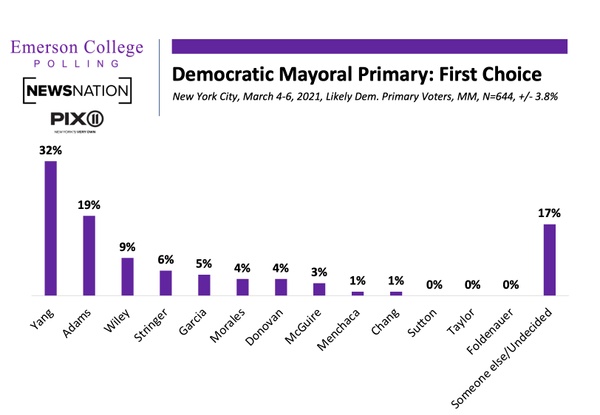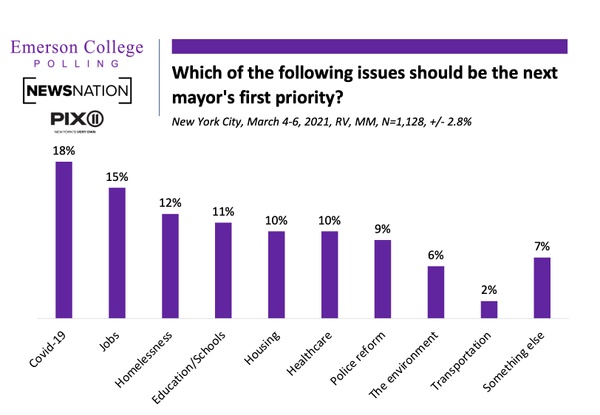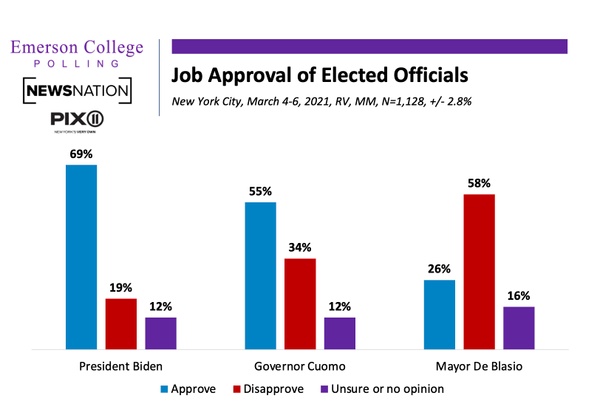In the first WPIX-TV/NewsNation/Emerson College poll of the New York City mayoral race, entrepreneur Andrew Yang leads the crowded Democratic primary with support from 32% of likely Democratic voters. Rounding out the top five candidates at this stage in the race are Brooklyn Borough President Eric Adams at 19%, followed by former counsel to Mayor de Blasio Maya Wiley at 9%, NYC Comptroller Scott Stringer at 6%, and Former NYC Department of Sanitation Commissioner Kathryn Garcia at 5%. All other candidates polled under 5%, and 17% of respondents answered someone else (n=644, +/-3.8%).
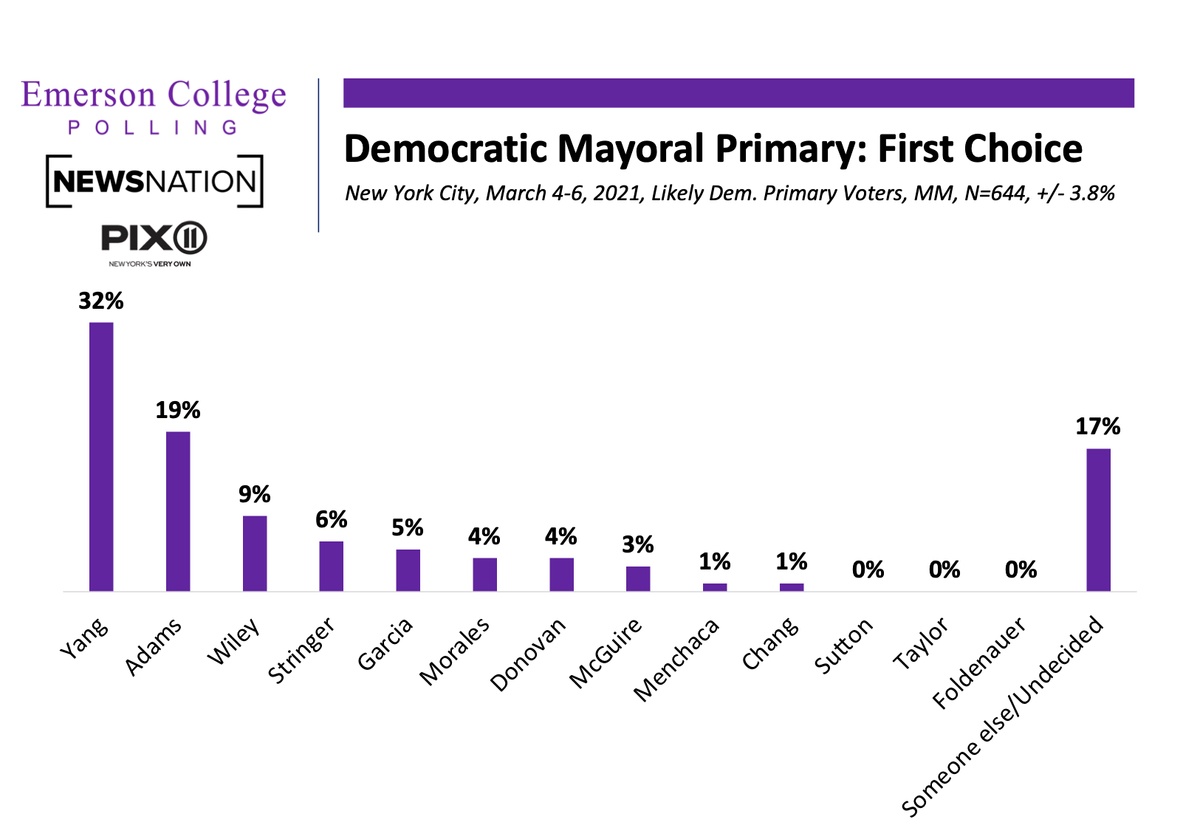
- Yang leads with White (50%) and Asian (60%) voters
- Adams leads with Black/African American voters (31%) and with Hispanic voters (26%)
- A majority, 56%, of voters 18-29 are breaking for Yang
- Yang gets 41% of the male vote and 26% of the female vote
As New York City prepares to use ranked-choice voting in this election, a plurality (40%) of likely Democratic primary voters say they’ve heard a little about the system. A third (33%) of voters have heard nothing about ranked-choice voting, and 26% have heard a lot. When asked if they feel if ranked-choice voting will lead to less negativity in the mayoral campaigns, a majority (63%) believe it will not, while 37% believe it will.
Adams ranks highest among voters’ second-choice candidates, at 11%, followed by Yang at 9%, and Stringer at 8%. Twenty-nine percent (29%) of voters indicated that they would not rank any candidate as their second choice at this time.
All registered voters were asked what issue should be the next mayor’s first priority, and Covid-19 ranked first, at 18%, followed by jobs at 15%, homelessness at 12%, education at 11%, housing at 10%, and healthcare at 10% (n=1128, +/-2.8%).
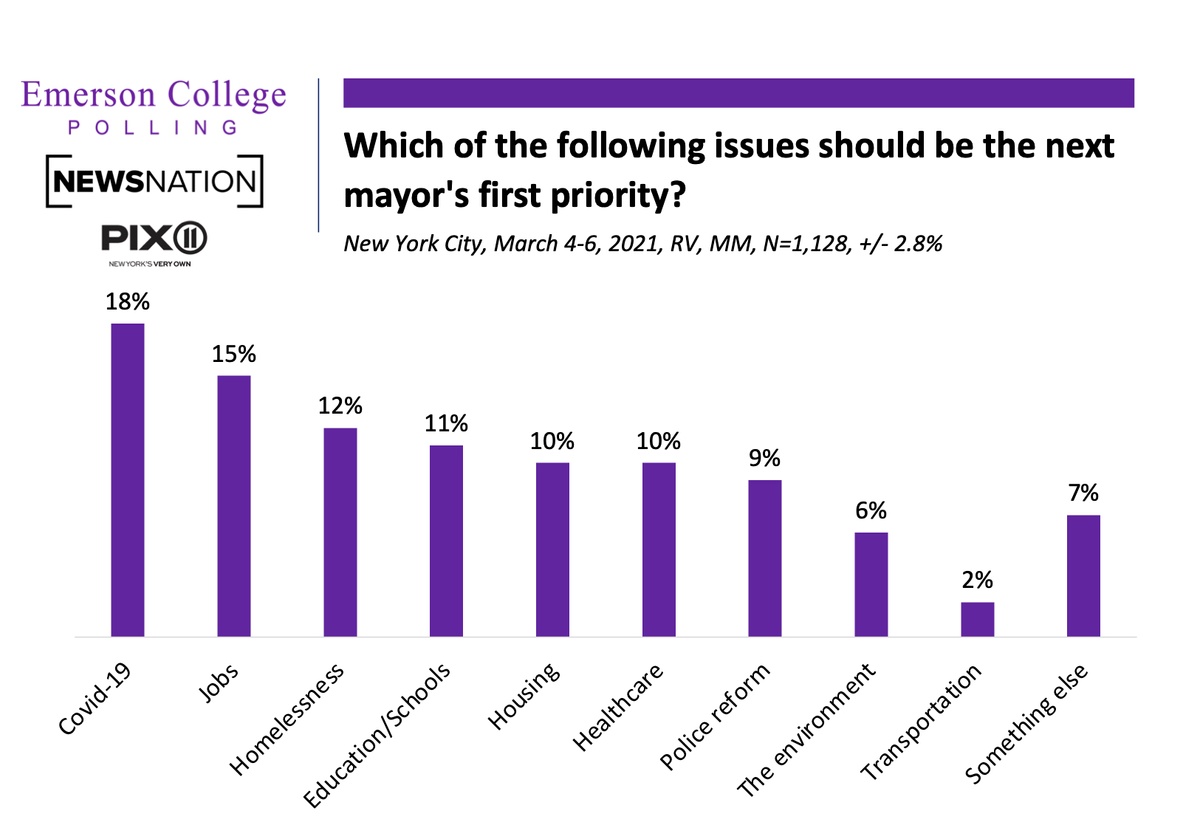
- The most important issue for Yang voters is Covid 19 (20%)
- Adams voters most important issues are housing (21%) and homelessness (21%)
- Wiley voters most important issue is police reform (29%)
Voters are confident that the upcoming NYC mayoral election will be conducted fairly by the Board of Elections, with 48% very confident, and 35% somewhat confident. Twelve percent (12%) of voters are not too confident, and 5% are not at all confident in the BOE.
A majority (51%) of voters believe that absentee voting access should be increased in the city, while 32% believe it should be maintained, but not increased, and 17% believe access to absentee voting should be restricted.
A majority of voters (62%) believe that it is not important that the next mayor of New York City is a person of color, while 25% believe it is somewhat important, and 14% believe it is very important.
Sixty-five percent (65%) say that it is not important that the next mayor of New York City is a woman, while 25% believe it is somewhat important and 10% believe it is very important.
When it comes to the spouse or partner of the Mayor of NYC, a majority (55%) of voters believe the spouse or partner should be very or somewhat involved in the government, while 25% believe they should be not very involved, and 21% say they should not be involved at all.
Approval of Public Figures
President Biden has a 69% approval among voters in New York City with 19% disapproving. Governor Andrew Cuomo’s approval rating is relatively high, at 55% approval and a 34% disapproval, compared to the last New York Emerson/WPIX-TV poll which had Cuomo at only 38% approval statewide. Mayor Bill De Blasio's approval rating is underwater, at 58% disapproval and 26% approval.
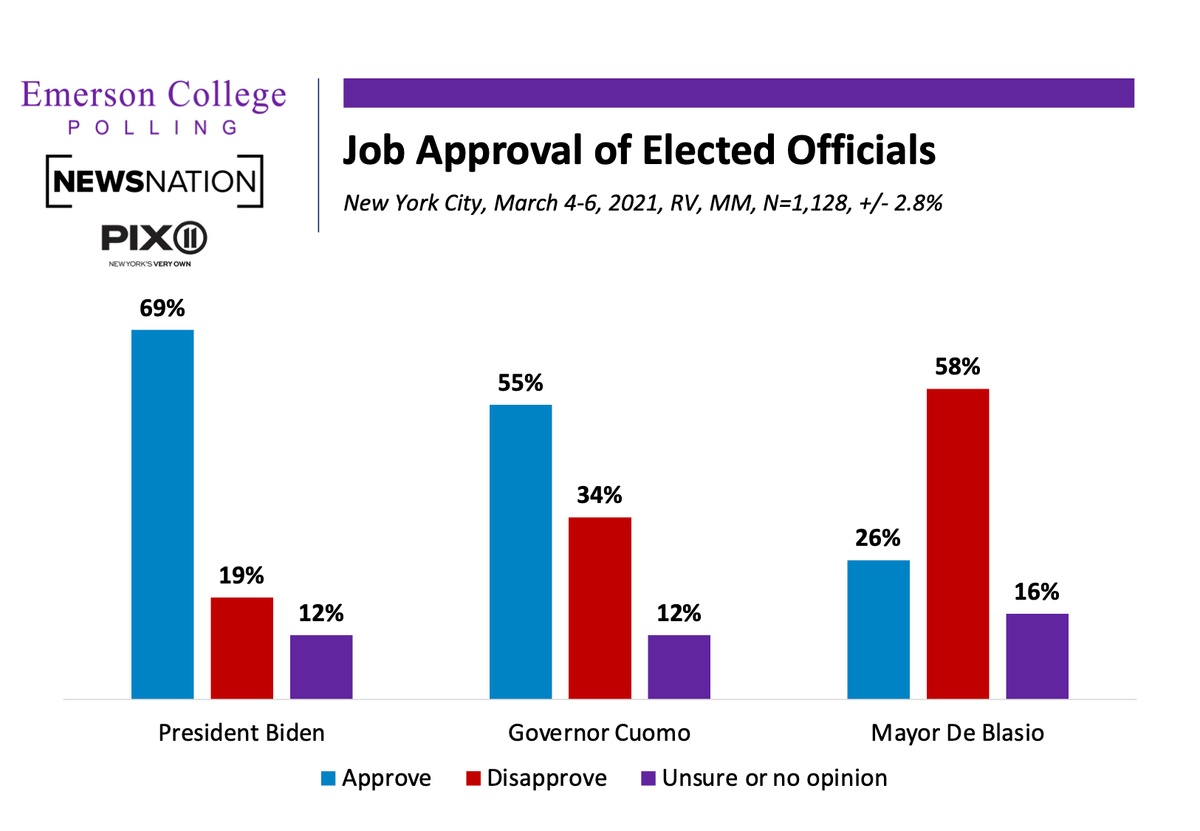
- Cuomo has a 64% approval/25% disapproval rating with females
- Cuomo has a 44% approval/44% disapproval rating with males
- De Blasio has a 26% approval with males and a 27% approval with females
A majority (53%) of NYC voters believe that Cuomo’s response to the pandemic in nursing homes was improper, but not to the level of impeachment. Twenty-one percent believe that Cuomo did nothing wrong on this issue, as compared to 26% who view his actions as grounds for impeachment.
COVID-19 response
A majority (53%) of NYC voters plan to receive the Covid-19 vaccine as soon as it is available to them. Twenty-four percent (24%) say that they will receive the vaccine, but not immediately, while 12% say they will not get the vaccine. Eleven percent (11%) of respondents indicated that they have already been vaccinated.
Nearly half, 49% of voters identify as being very well informed about when they will be eligible to receive the vaccine; 34% report being somewhat informed, 12% said they were not very informed, and 6% reported not being informed at all.
More than a quarter (26%) of voters believe that if someone has contracted Covid-19, they are now vaccinated against the virus.
When asked if race and ethnicity are impacting who is first to get the vaccine, a majority of voters (54%) said it was not, while 46% believe that it is.
Regarding the re-opening of high schools for in-person instruction this school year, voters were split: 51% believe that high schools should be opening this year, and 49% believe that they should wait until the start of the next school year at the earliest.
Public Transportation
A plurality (46%) of NYC voters rate the quality of their area’s public transportation as good, while 26% say it is fair, 16% say it is poor, as compared to 13% who say it is excellent.
Partisan ideology appears to have an impact on how people rate public transportation in their area: 73% of Democrats rate it as good/excellent, as compared to 38% of Republicans. Fifty-five percent (55%) of Independents believe their public transportation is good/excellent.
Looking at race and ethnicity, Hispanics rated public transport the lowest, with 26% reporting public transportation in their area of residence as poor, compared to 18% of Asians, 11% of Blacks/African Americans, and 8% of Whites who judged public transportation in their area of residence as poor.
Caller ID
The New York City Emerson College/WPIX-TV/NewsNation poll was conducted March 4-6, 2021. The sample consisted of New York City registered voters, n=1,128, with a Credibility Interval (CI) similar to a poll’s margin of error (MOE) of +/- 2.8 percentage points. The data sets were weighted by gender, age, education, race, party affiliation, and region. It is important to remember that subsets based on gender, age, party breakdown, ethnicity, and region carry with them higher margins of error, as the sample size is reduced. Data was collected using SMS-to-web, and an online panel provided by CloudResearch.

